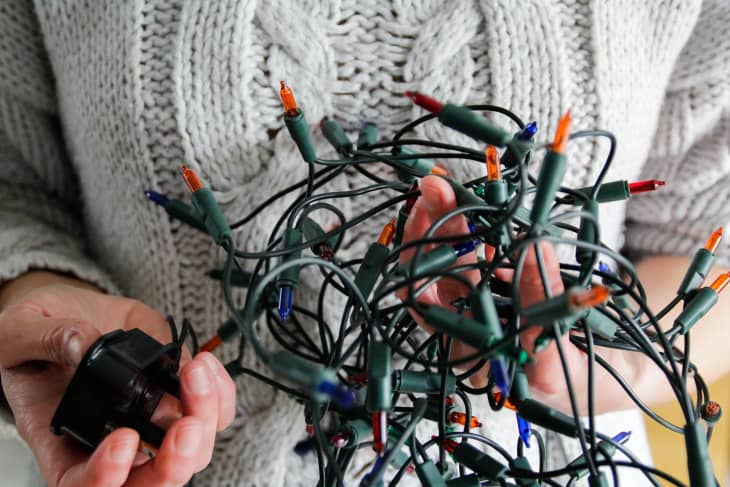Don’t Throw Out Broken Christmas Lights — Here Are 7 Ways to Recycle Them

When I asked my child to grab an empty plastic bin from the basement, I did not at all mean, “Please go to the basement, pour out a container of Christmas decorations onto the hard concrete floor, and bring the empty bin to me.” Clearly, my communication skills were at fault.
7 Ways to Recycle Christmas Lights
- Visit a participating hardware store.
- Try a grocery store.
- Visit a local recycler.
- Head to the thrift store.
- Recycle by mail.
- Reuse them.
- Put them in a Ridwell bin.
All this to say, I fully expect that at least a few strands of our Christmas lights will be broken when we decorate the tree next week. Luckily, there are plenty of ways to recycle the malfunctioning lights, and my favorite option could not be easier.
Visit participating hardware stores.
This method is a win-win. Drop your broken lights at participating hardware stores, such as The Home Depot, during their recycling windows. The best part? You can pick up replacements while you’re there. Be sure to call ahead, as some locations offer this recycling service and others do not.
Try a grocery store.
If you’re lucky enough to live near a MOM’s Organic Market, you can drop off your broken string lights when you pick up cranberry sauce and holiday pies.
Visit a local recycler.
I live in Portland, Oregon, where lots of people are committed to recycling. If you live in a similarly green metro area, look for a Find a Recycler search tool on your city’s website. My “holiday lights” query had more than a dozen local results, including Free Geek and Pride Disposal Company. If your city doesn’t offer a Find a Recycler program, try the Green Directory search tool from Green Citizen instead, and use the search term “Christmas lights.”
Head to the thrift store.
Select Habitat for Humanity ReStore locations offer an onsite metal recycling program and will strip holiday lights for copper. Contact your local store to make sure they accept string lights before you go. Goodwill and Salvation Army will accept *working* holiday lights. This is a great option if you decide to go with a new color this year and need to find a home for last year’s functional lights.
Recycle by mail.
I find mailing packages inexplicably difficult, but if a trip to the post office, FedEx, or UPS store feels like a breeze to you, simply mail your old Christmas lights to Holiday LEDS at this address: Holiday LEDS Recycling, W227N6225 Sussex Road, Door No. 12, Sussex, WI 53089. Once you’ve mailed your lights, complete this online form to receive a coupon for new lights! Green Citizen also offers string light recycling by mail, although they charge a small fee in addition to shipping costs.
Reuse them (really!).
If you use vintage-style strands with large bulbs, you can spray paint the bulbs silver or gold to create a DIY holiday garland. They also make great gift decorations in lieu of a bow, or you can add them to a napkin ring for a DIY seasonal touch. It’s harder to reuse standard strands with small bulbs, but if only a few lights are out, you can use them to decorate a holiday wreath or place them in a jar for a festive night light.
Put broken holiday lights in your Ridwell bin.
This is my favorite method of them all because it requires almost no effort. I pay a small fee for twice-monthly recycling pick-ups from Ridwell. Every December or January, one of their rotating categories is “holiday lights.” I drop broken strings in the cute “Featured Category” canvas bag and move on with my day. Find out if Ridwell serves your neighborhood here.
Whether your lights met their end on a concrete floor like mine (sigh) or they finally burned out after years of service, the good news is you have plenty of options for disposing of them safely. Wherever you live, you can avoid sending all of that plastic, copper, and glass to a landfill.